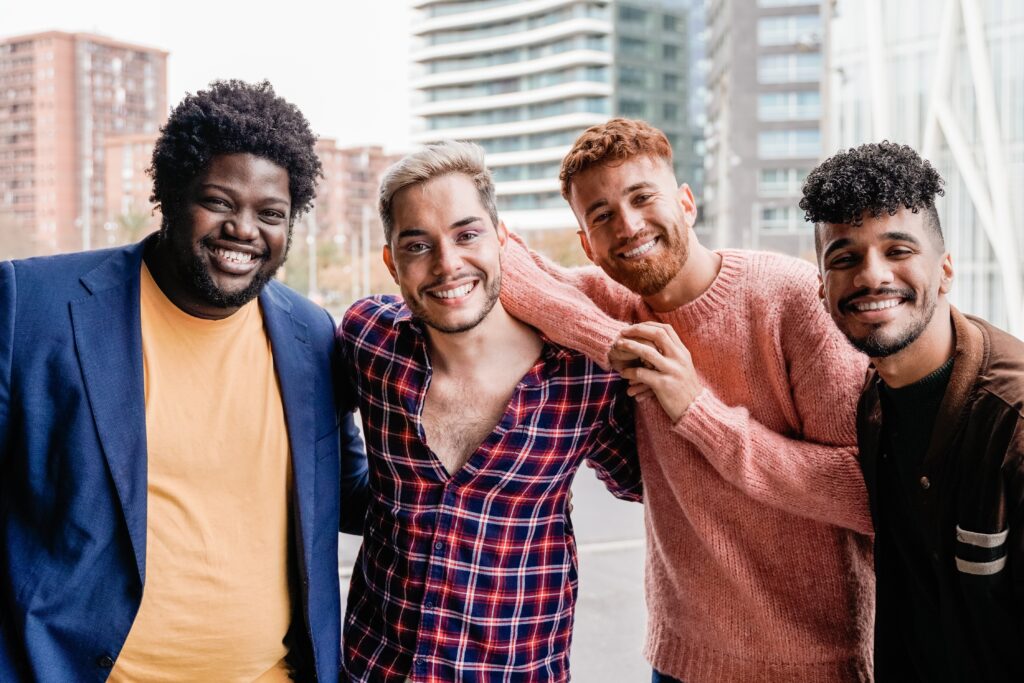
Coping with Social Anxiety during Pride Season
Happy Pride, bears! Given it is the time of year for parades, parties, and other community-oriented activities, let’s discuss social anxiety and how best to manage it. I think it’s fair to say that many, including myself, experience social anxiety to some degree – especially given it is the 3rd most diagnosed mental health disorder globally.
Let’s briefly talk about what social anxiety is, though the name is fairly self-explanatory. It’s often characterized by intense fear or discomfort in social interactions. It can manifest as feelings of self-consciousness, fear of judgment or rejection, and physical symptoms such as rapid heartbeat or sweating. I think social anxiety may be particularly challenging for bears, as societal stereotypes or body image concerns can place additional pressure on social interactions and the desire to “fit in.” All in all, social anxiety hinders our ability to fully engage in social situations. Let’s explore a few ways to navigate and manage social anxiety:
1. Cultivate Self-Acceptance:
One key aspect of managing social anxiety is cultivating self-acceptance. A common cognitive bias that we humans make is assuming we know what the people around us are thinking. Often, our anxious brains may assume others are judging us or evaluating us – and when we have poor or negative opinions of ourselves, we assume others will too. Embracing one’s identities and acknowledging the uniqueness and diversity within ourselves and our vibrant queer community can foster a sense of belonging and self-worth. Recognizing that there is no one-size-fits-all definition of a gay man, a bear, or any other identity and celebrating individuality can help alleviate anxieties related to “fitting in” or meeting the expectations of others.
2. Building Social Support:
Developing a network of supportive connections within your community can be immensely beneficial for managing social anxiety, whether that be in the bear community or otherwise. Engaging in social activities with others who share similar lived experiences, interests, and values can help us form friendships and stave off feelings of isolation. Attending bear events, joining online communities, or participating in social or hobby-based groups can provide opportunities for meaningful connections, support, and a safe space to navigate social interactions.

3. Practice Self-Care:
Prioritizing self-care is crucial in managing social anxiety. Engaging in activities that promote mental and emotional well-being, such as exercise, meditation, or creative outlets, can help reduce stress and anxiety. Additionally, maintaining a balanced lifestyle with adequate sleep and regular physical activity can contribute to overall resilience and a more positive mindset overall. Sleep especially has an important relationship to anxiety, and is something many of us don’t prioritize enough.
4. Challenge Negative Thoughts:
Negative thoughts and self-doubt often fuel social anxiety. It’s important to challenge these thoughts by questioning their validity and considering alternative perspectives. I’ll caution you that doing this is a skill in and of itself, as “thinking about thinking” is a challenging exercise, though it does become easier with practice. Cognitive-behavioral therapy techniques, such as identifying and reframing negative beliefs, can be helpful in shifting the focus from self-criticism to self-compassion. Seeking professional support from therapists or counselors who specialize in anxiety disorders can also be incredibly helpful and assist with processing anxious thoughts.
5. Gradual Exposure:
Facing social anxiety head-on can be daunting, but gradual exposure to social situations can help build confidence and diminish anxiety over time. Starting with small, manageable steps such as attending low-pressure social gatherings or engaging in online conversations can serve as steppingstones towards more challenging situations. With each successful experience, you can expand your comfort zones and develop a greater sense of self-assurance.
All in all, navigating social anxiety can be challenging, but fortunately it is an incredibly common issue that can be worked through in talk-therapy. If all of this feels like too much to navigate on your own, finding a mental health professional can help make navigating your social anxiety less overwhelming. If you do decide to try and put yourself out there socially a bit more this pride season, I hope these tips prove helpful! Please feel free to share in the comments below if you’ve found any unique strategies or tools that you personally use to help navigate anxiety in social situations. Happy Pride!













